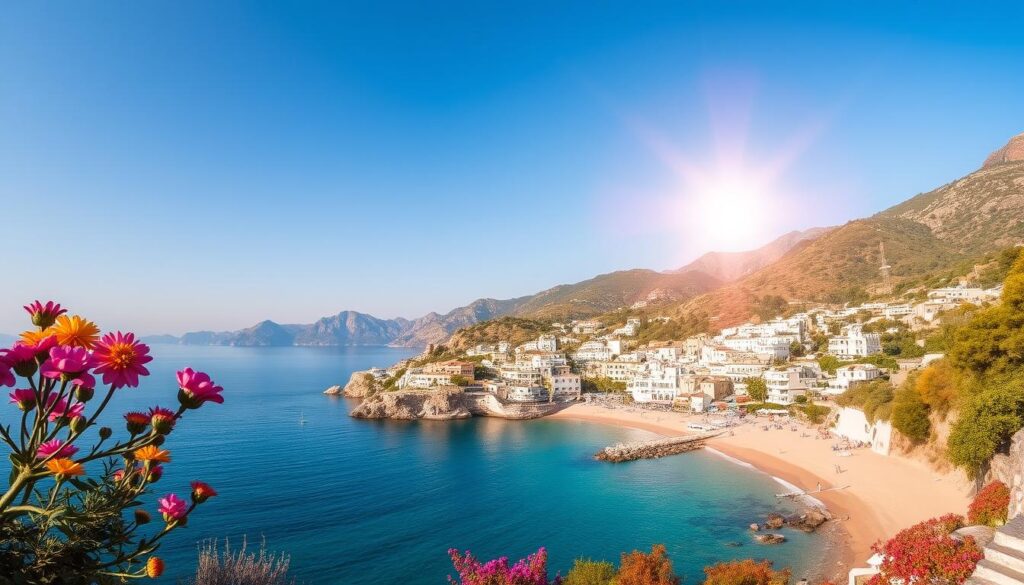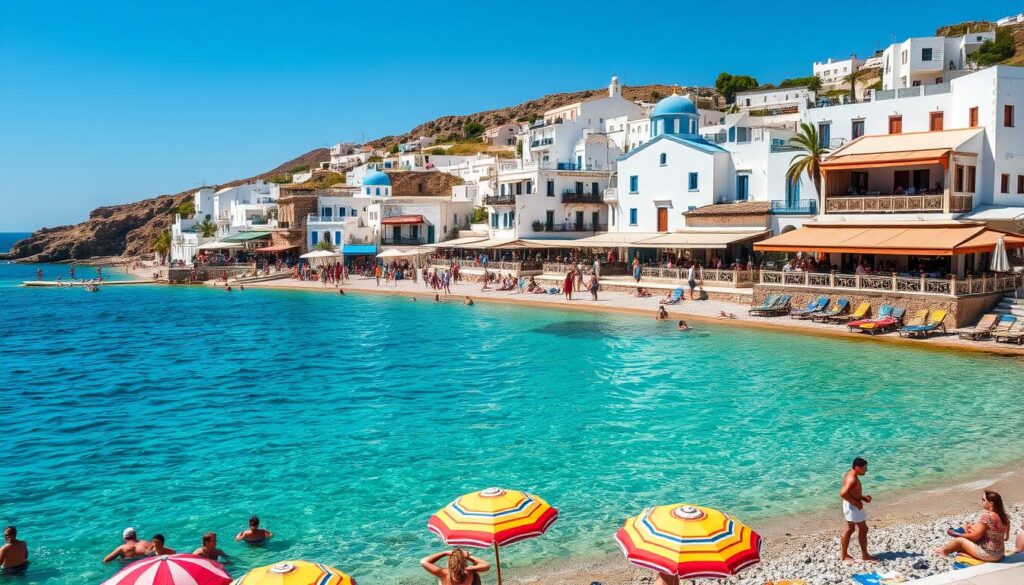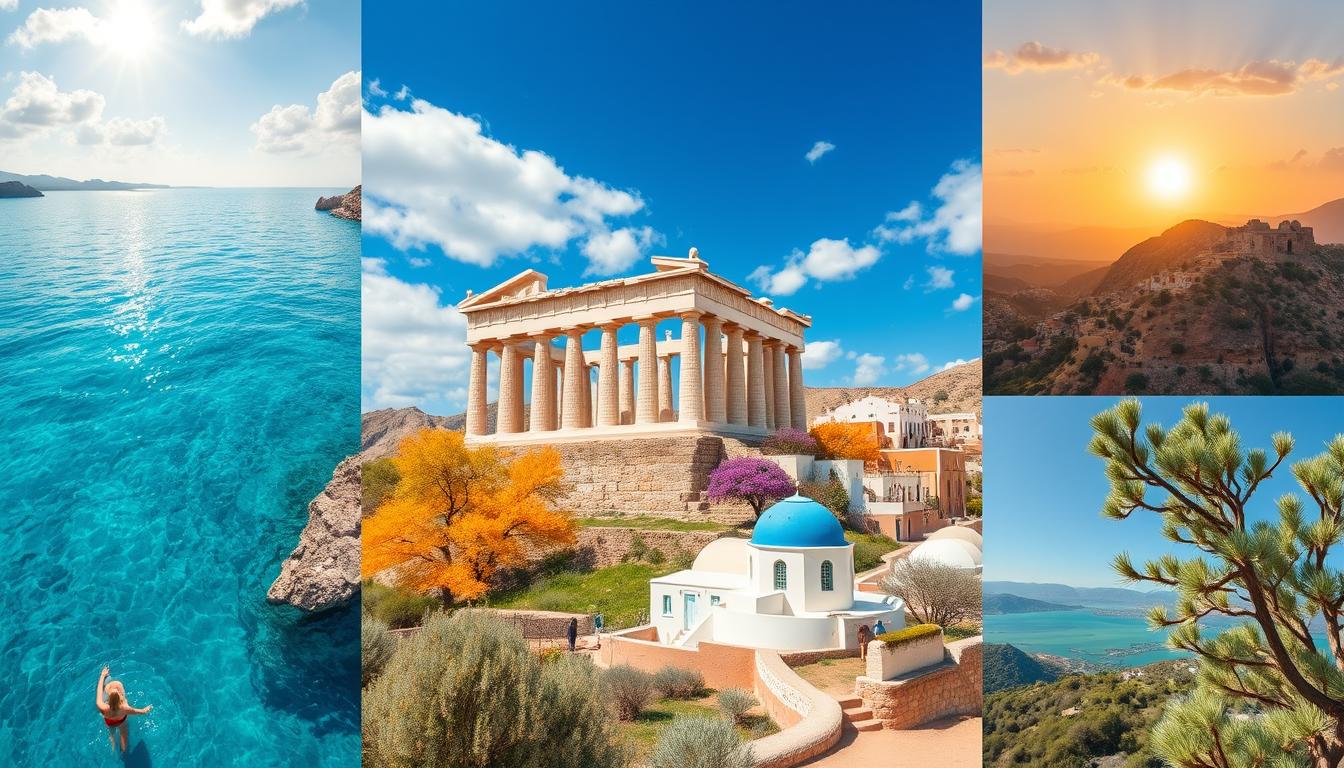Best Times to Visit Greece 2025: A Month-by-Month Breakdown
Looking out at the Aegean Sea, I feel awe and wonder at Greece’s beauty. The sun-kissed islands and ancient ruins are a feast for the senses. But when are the best times to visit Greece?
Are you dreaming of a beach holiday, cultural immersion, or vibrant festivals? The ideal time to visit varies. In this guide, we’ll explore Greece’s seasons to help plan your trip.
Key Takeaways
- Greece has four seasons: spring, summer, autumn, and winter.
- Summer is peak tourist season, but spring and autumn are better for fewer crowds.
- Winter is cheaper but cooler with occasional rain.
- The best time to visit Greece depends on your preferences and activities.
- Understanding weather and seasonal highlights is key to planning your Greek trip.
Understanding Greece’s Climate and Seasons
Greece has a typical Mediterranean climate. It has mild, wet winters and dry, hot summers. The country gets lots of sunshine all year, attracting visitors who love warm weather and outdoor fun. But, the temperature varies a lot in different parts of Greece.
Mediterranean Weather Patterns
In northern Greece, winters are colder, with temperatures from 5°C to 32°C. Southern areas are milder, with temperatures between 11°C and 33°C. Coastal areas get cool sea breezes in the summer.
Four Distinct Greek Seasons
- Spring (March-May): It starts to get warmer, with highs in the mid-70s Fahrenheit (around 24°C) by May.
- Summer (June-August): This is the busiest time, with hot, dry weather and highs in the 90s Fahrenheit (around 32°C).
- Autumn (September-October): It’s mild and less crowded, with highs in the 60s and 70s Fahrenheit (16-24°C).
- Winter (November-February): It’s the wettest time, with highs in the 40s to 60s Fahrenheit (7-16°C), making it the off-season for tourists.
Regional Climate Variations
Greece’s climate varies by region. The mountainous north is colder in winter and cooler in summer than the southern islands. The southern islands have a more tropical climate. Coastal areas are milder all year due to the sea’s influence.
| Region | Average Temperature Range |
|---|---|
| Northern Greece | 5°C to 32°C |
| Southern Greece | 11°C to 33°C |
| Coastal Areas | Milder temperatures year-round |
Knowing about Greece’s climate and seasons helps plan the best trip. Whether you want beach time, cultural visits, or a quiet winter getaway, Greece has it all.

Peak Season in Greece: Summer Months
The months of July and August in Greece are the hottest and sunniest. This makes it perfect for enjoying beaches and island life. Temperatures are just right for outdoor fun and water sports, ranging from 15°C to 33°C.
But, these months also mean big crowds and high prices everywhere. Places like Santorini, Mykonos, and Crete are packed with tourists. Travel to remote islands is also more frequent.
The Greek Orthodox holiday of the Assumption of the Virgin Mary on August 15th is a big event. It can affect travel plans. So, it’s good to keep this in mind when planning your trip to Greece.
| Location | Average High Temperature (°C/°F) | Average Low Temperature (°C/°F) | Average Water Temperature (°C/°F) |
|---|---|---|---|
| Athens (Central) | 31°C (88°F) | 27°C (81°F) | N/A |
| Santorini | 28°C (84°F) | 23°C (73°F) | 24°C (75°F) |
| Crete (South) | 28°C (82°F) | 25°C (77°F) | N/A |

“The summer months in Greece are a true paradise for sun-seekers and beach enthusiasts, but the crowds and higher prices can be a trade-off to consider.”
Best Times to Visit Greece for Different Activities
Greece is a great place to visit all year round. You can enjoy beaches, history, and culture at the best times. Whether you want to relax on the beach or explore ancient sites, there’s a perfect time for you.
Beach and Island Hopping
The best months for beach fun and island hopping are mid-May to September. The sea is warm, perfect for swimming and snorkeling. This is the best time for a greek island hopping adventure.
Historical Sightseeing
For history buffs, spring (April-June) and autumn (September-October) are ideal. The weather is mild, and there are fewer people. You can enjoy Greece’s history and culture without the summer heat.
Cultural Festivals and Events
Greece has many festivals and events all year. Highlights include the Patras Carnival, Greek Orthodox Easter, and the Athens International Film Festival. You’re sure to find something exciting to do, no matter when you visit.
Plan your trip to match the best seasons for your activities. This way, you’ll have a great time and make unforgettable memories in Greece.
| Activity | Best Time to Visit |
|---|---|
| Beach and Island Hopping | Mid-May to September |
| Historical Sightseeing | April-June, September-October |
| Cultural Festivals and Events | Year-round |
“Greece is a land of contrasts, where ancient history meets modern vibrance. By planning your trip to coincide with the best times for your desired activities, you’ll unlock the full richness of this captivating destination.”
Spring in Greece (March-May)
Experience the beauty of Greece in spring as it awakens with wildflowers, mild weather, and fewer people. From March to May, it’s the best time to see Greece’s varied landscapes and rich culture.
In March, Greece’s weather is mild, with temperatures between 10°C (50°F) and 16°C (61°F). Southern areas like Crete and Rhodes are a bit warmer than the north. Coastal spots enjoy sunny skies, perfect for exploring outdoors.
As spring goes on, April welcomes the start of the tourist season. Temperatures reach about 16°C (61°F). It’s a great time to see the Greek spring festivals, like the Easter celebrations, which are big cultural events.
- The Salsa Spring Festival in Corinthia is a hit. It celebrates spring with music, dance, and cultural fun.
- May brings warmer weather, with temperatures around 21°C (70°F). It’s a good time to visit without the crowds, exploring mainland Greece and islands.
“Spring in Greece is a magical time when the countryside bursts with color and the air is filled with the scent of blooming flowers.”
Spring in Greece is perfect for history buffs, culture lovers, or those who just want to enjoy the weather. Spring travel in Greece is an experience you won’t forget.
Summer Tourism and Weather (June-August)
Summer in Greece is the peak travel season. It’s hot with temperatures between 25°C and 35°C. This is the best time to see the greek islands summer and enjoy the beach culture.
Managing Peak Season Crowds
June starts the high season, with more people and higher prices. July and August are the busiest and most expensive. To avoid the crowds, book your stay and tours early.
Summer Festivals and Celebrations
- The Festival of the Aegean in Syros, showcasing music, dance, and cultural performances.
- The Athens Festival, a renowned event featuring theater, music, and dance productions.
- The Sani Festival in Halkidiki, celebrating art, music, and gastronomy.
Island Life in Summer
The Greek islands buzz with life in summer. Beaches are packed, and the nightlife is lively. Visitors can explore beautiful landscapes, try local food, and dive into the island culture.
Autumn Travel in Greece (September-October)
As summer’s heat fades, Greece in autumn becomes a perfect time to explore. Temperatures range from 15°C to 25°C, ideal for fall travel to Greece. September’s sea is still warm for swimming, and October offers fewer tourists and lower prices.
This season is great for sightseeing in mainland Greece and the Greek islands. You can dive into the country’s history and culture. Visit ancient ruins, charming villages, and vibrant cities without the summer crowds.
Several Greek autumn events make this time special. Highlights include the Athens International Film Festival, the Reworks Festival in Thessaloniki, and the Chestnut Festival in Crete. These festivals celebrate the harvest and add to the autumn charm.
| Region | Average Temperatures in October |
|---|---|
| Northern Greece (Thessaloniki) | Daytime highs: 61°F – 72°F (16°C – 22°C) Nighttime lows: 46°F – 55°F (8°C – 13°C) |
| Central Greece (Athens) | Daytime highs: 64°F – 75°F (18°C – 24°C) Nighttime lows: 52°F – 61°F (11°C – 16°C) |
| Southern Greece and Islands (Crete, Santorini, Mykonos) | Daytime highs up to 77°F (25°C) |
Greece in autumn offers pleasant weather, fewer crowds, and exciting events. It’s a great time to see the country’s landmarks, enjoy island life, or experience cultural festivals. The fall travel to Greece in September and October is unforgettable.
“The most beautiful autumn I ever saw in Greece was the one I spent on Crete. The island was ablaze with the colors of the changing leaves, and the air was crisp and invigorating.” – John Steinbeck
Winter Season and Off-Peak Benefits (November-February)
Greece’s winter, from November to February, is a special time to visit. The weather is cooler, with temperatures between 5°C and 15°C. This season is great for those who want to see the country’s history, culture, and nature without the summer rush.
Winter Activities and Attractions
In the north, you can ski and snowboard on the mountains. For a calmer experience, visit ancient sites and ruins without the summer crowds. Greece in winter is also a chance to explore cities like Athens and Thessaloniki. You can enjoy local food and traditions.
Holiday Season Celebrations
The winter in winter travel greece is filled with holiday cheer. Visit Christmas markets for local treats, crafts, and holiday vibes. The Epiphany in January is also a highlight, showing the country’s traditions and culture.
For film lovers, the Thessaloniki International Film Festival in November is a must. It features independent and avant-garde films, offering a unique cultural experience.
“The off-peak winter season in Greece offers a chance to experience the country’s rich cultural heritage and natural beauty without the crowds and high prices of the summer months.” – Greek Tourism Expert
Budget-Friendly Travel Periods
Traveling to Greece on a budget is easy if you plan your trip right. The best times to visit are in the spring (March-May) and fall (September-October). Also, the winter months (November-February) are great for saving money.
During these seasons, the weather is mild, and there are fewer people around. This means you can find cheaper flights, places to stay, and other travel costs. For example, flights from North America to Greece are often cheaper in May and September than in the summer.
Greece has many affordable places to stay. Hostels offer dorm beds for $12-$18 (€10-€15) per night. Private rooms cost about $30 (€25) per night. If you prefer a hotel, you can find mid-range options in central areas for $60-$180 (€50-€150) per night.
| Accommodation Type | Average Nightly Rate |
|---|---|
| Hostels (Dorm Bed) | $12-$18 (€10-€15) |
| Hostels (Private Room) | $30 (€25) |
| Mid-Range Hotels | $60-$180 (€50-€150) |
Avoid traveling in the peak summer months (June-August) and during Easter week. Prices go up a lot during these times because of more tourists.
By choosing to travel during the shoulder or low season, you can save a lot. Enjoy Greece’s mild weather, fewer crowds, and lower prices. This way, your low season greece vacation will be both affordable and memorable.
Essential Travel Tips for Each Season
Getting ready for your Greece trip means knowing what to pack and how to get around for each season. Whether you’re off to the beach in summer or exploring culture in winter, these tips will help you enjoy Greece to the fullest.
What to Pack
The weather in Greece changes a lot throughout the year. So, your packing list needs to change too. In summer, wear light, airy clothes and lots of swimwear. Remember to pack sun protection like hats, sunglasses, and sunscreen with high SPF.
In spring and autumn, bring jackets, long pants, and comfy shoes for the mild, sometimes unpredictable weather. For winter, pack warm clothes like sweaters, coats, and scarves to stay warm.
Transportation Considerations
In the summer, Greece’s transport is busiest, with many ferries to the islands. But in winter, ferries run less often, so plan your island trips carefully. Flights to Greece’s big spots are available all year, offering a steady travel option.
Accommodation Planning
Book your place to stay early, especially in summer. Many island hotels and rentals close in winter, so choices are fewer. For longer stays or groups, think about vacation rentals. They usually have more room and extras than hotels.
Remember these tips for a smooth, fun trip to Greece. They’ll help you pack right, get around easily, and find great places to stay for an amazing Greece adventure.
Conclusion
The best time to visit Greece depends on what you like. May to June and September to October are great. They have nice weather and fewer people.
If you love beaches, July and August are warm. But, they’re also busy and expensive.
Winter, from November to February, is cheaper but cooler. It’s good for saving money but some places might be closed.
Think about what you want to do, how you feel about crowds, and your budget. Knowing Greece’s seasons helps plan a great trip. You can make your visit to Greece unforgettable, whether you’re looking for the best time visit greece, greece travel planning, or the perfect greece vacation tips.
Greece has something for everyone all year. You can make your trip special by choosing what you like.








5 Comments
Comments are closed.